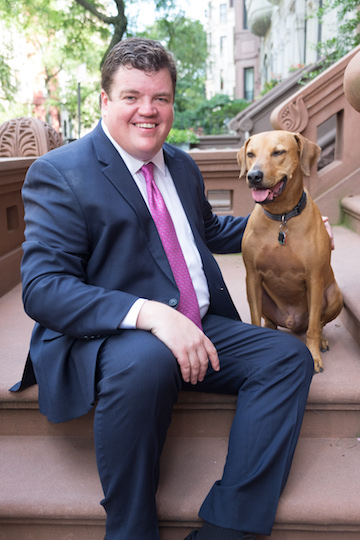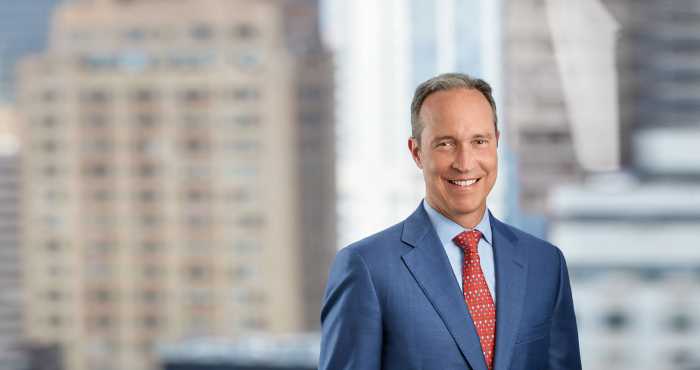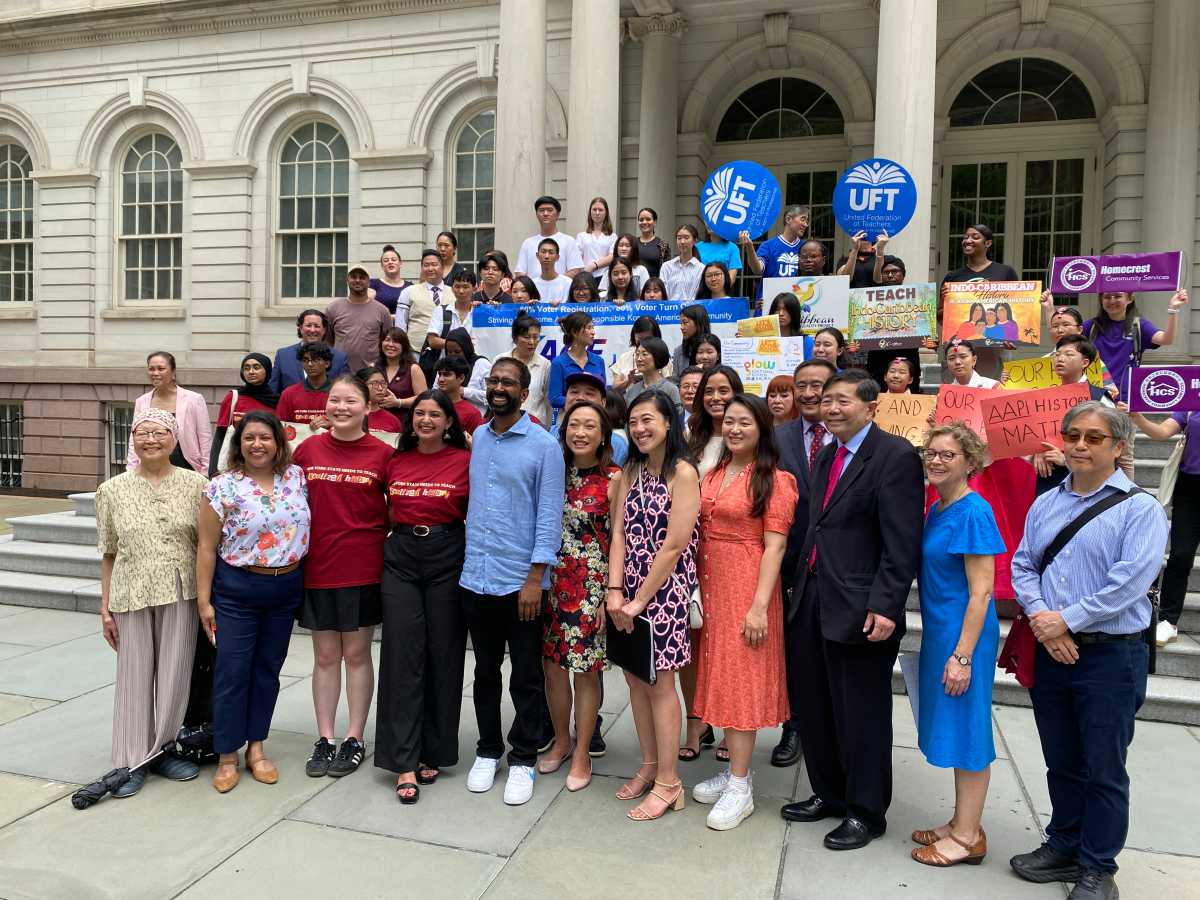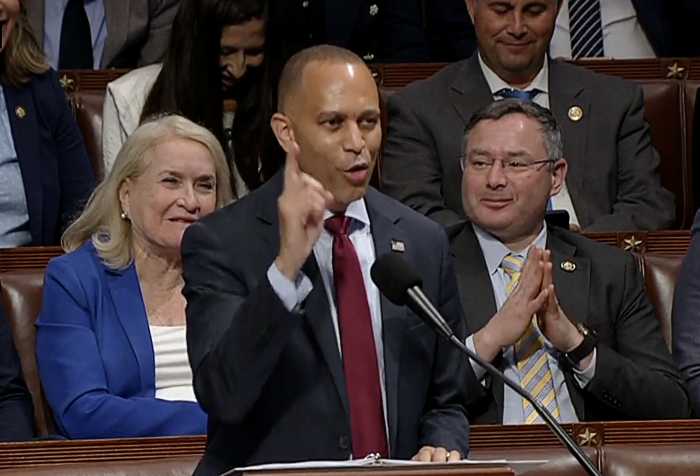
Bill Raudenbush, an independent candidate for the District 6 City Council seat, is opposed to any incursion on the Theodore Roosevelt Park from the expansion of the American Museum of Natural History.
BY JACKSON CHEN | In a City Council race in which controversy over expansion plans by the American Museum of Natural History has grabbed considerable attention, one opponent of the Richard Gilder Center for Science, Education and Innovation’s incursion into a small portion of the surrounding Theodore Roosevelt Park is waging an independent campaign for the District 6 seat currently held by Helen Rosenthal.
Bill Raudenbush, 38, announced his independent candidacy for the Upper West Side Council seat in June. Rosenthal faces off next week against Democratic primary challengers Mel Wymore, who was her runner-up four years ago, and Cary Goodman, another opponent of the Gilder Center project. Raudenbush and a second independent candidate, David Owens, a finance and real estate professional, will then compete with the Democratic victor in November.
While his great-grandfather arrived in America at Ellis Island in 1908 and his maternal grandparents met and were married in New York, Raudenbush, raised by entrepreneur parents in Denver, arrived on the Upper West Side just two years. His passion for community advocacy, however, extends back much further, he emphasized. Putting a high value on green space as vital for an urban community, the challenger has butted heads with the museum expansion plan. The controversial $340 million project has divided the Upper West Side neighborhood, with Gilder Center proponents emphasizing the museum’s vital scientific mission while critics fault the threats the expansion poses to the park’s natural and social ecology.
Raudenbush opposes the museum’s taking of any park land, in line with the mission of Community United to Protect Theodore Roosevelt Park, which he has served as vice president. “It just seems so natural to me that we would want to continue to have our quiet, peaceful, tranquil outdoor space,” he said. “People don’t realize it, but it’s so quietly rejuvenating. You don’t miss it until it’s gone.”
On that point, he joins scores of museum neighbors who oppose the project. While incumbent Rosenthal has praised the project, Goodman voices the same definitive position as Raudenbush toward any incursion on Theodore Roosevelt Park land, while Wymore has staked out an intermediate posture. Raudenbush said he is unsatisfied with any of the three Democrats. The independent candidate explained he originally approached Wymore with research he had done about the Gilder Center project’s impact on the park, but was disheartened by the response he received. He felt Wymore was unclear about his position and would ultimately support the project if elected.
Wymore insisted that he’s been very clear about his stance, citing his strong opposition to the $100 million in public funding being poured into the project without more community say. If elected, Wymore said, he would freeze any city funds and focus on negotiations until an outcome that satisfies all sides is reached. “I am generally supportive of the museum as a world-class institution,” he said. “But I actually feel very strongly that this project is suffering from a lack of community dialogue and interaction with all of the stakeholders.”
Rosenthal herself has expressed dissatisfaction with one of the museum’s two working groups created to invite more community input. She said she is adamant that they address the expected congestion on Columbus Avenue and 81st Street. “I’m totally holding their feet to the fire on traffic,” the councilmember said. “I am unhappy with what they’ve come up with so far. It doesn’t even begin to address the issues, so we’re not done with them there.”
Goodman, the first candidate to step forward to challenge Rosenthal, shares much the same views on the Gilder Center project as Raudenbush. But Goodman argued that he has distinguished himself from Raudenbush with his 40 years of advocacy in the area. Raudenbush, in turn, has criticized Goodman’s campaign as “too absolute” in his opposition to the Gilder Center project. Goodman, who heads the 161st Street Business Improvement District in the Bronx, has consistently pushed the idea of establishing a satellite location for any museum expansion — perhaps in that borough — an idea about which the incumbent is dismissive.
“To those who say let’s put an annex in the Bronx, that’s very offensive to the elected leaders in the Bronx,” Rosenthal said. “They do not want an AMNH lite, L. I. T. E. in the Bronx. This is an opportunity for science to be robust. Why would they want a replica of a dinosaur in a building in the Bronx?”
Owens, the other independent in the race, stated that while he’s not happy about losing park land, he is willing to sacrifice a bit to strengthen the museum’s reach.
In addition to his advocacy for Theodore Roosevelt Park, Raudenbush hopes to present an alternative to the stagnant politics he sees among New York’s Democratic Party insiders. “Everyone’s out for themselves,” he said. “I don’t think it’s that hard to say you need to listen and do what is important to the people. Everyone seems to be tied into a special interest of have a big donor.”
Forgoing the preliminary round on September 12, Raudenbush hopes he can wage an uphill fall campaign to beat out the Democratic primary winner in the November 7 general election. “It’s very important that we are engaging the electorate and getting people to the polls for the health of our country and our democracy,” he said.



































